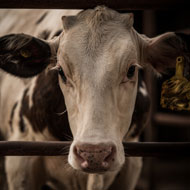
Pirbright scientists have developed two portable tests for diagnosing foot-and-mouth disease in the field - one of which can identify serotypes.
Scientists from the Pirbright Institute took the tests to Tanzania, Ethiopia and Kenya to confirm their effectiveness in the field. One is able to diagnose the presence of FMD, while the other can differentiate between the four serotypes that are prevalent in Africa.
There are seven types of FMDV, each of which requires a separate vaccine. Accurate diagnostics are essential to ensure the current vaccine is administered to protect against the serotype circulating in any particular area. However, until recently, field tests were only able to confirm whether or not the virus was present in a sample.
Lead researcher Dr Veronica Fowler said: “We know that the biggest hurdle to overcome when tackling FMD is getting a quick and accurate diagnosis of which serotype is present. The main issue is that many countries currently battling FMD outbreaks do not have labs with the facilities or expertise to test for the virus.
“This is why we have taken a lab test and reformatted it to suit the field. We simplified the reagents into pellets, so that users need only add water and the sample, which can then be placed in a mobile PCR machine. The machine can then identify any of the four FMD serotypes present in Africa.”
The diagnostics kit is battery powered and can process eight samples at once. The pellets for the test do not need to be refrigerated, which saves on transportation costs and maintenance. Additionally, Pirbright says the kit is so simple to use, it does not need a highly trained person to use it.
According to the institute, the diagnostics are as sensitive as the equivalent techniques used in the lab, and they can test epithelial, serum, mouth or throat fluid samples from animals. Using the test, animals can be diagnosed with FMDV, even if they are not displaying clinical signs.
Rolf Rauh from Tetracore, which developed the kits with Pirbright, said: “Rapid and accurate point-of-care field identification of FMD and its subtype are essential for mounting effective control efforts to stop animal movement before the virus has an opportunity to spread further.”



 The BSAVA has opened submissions for the BSAVA Clinical Research Abstracts 2026.
The BSAVA has opened submissions for the BSAVA Clinical Research Abstracts 2026.